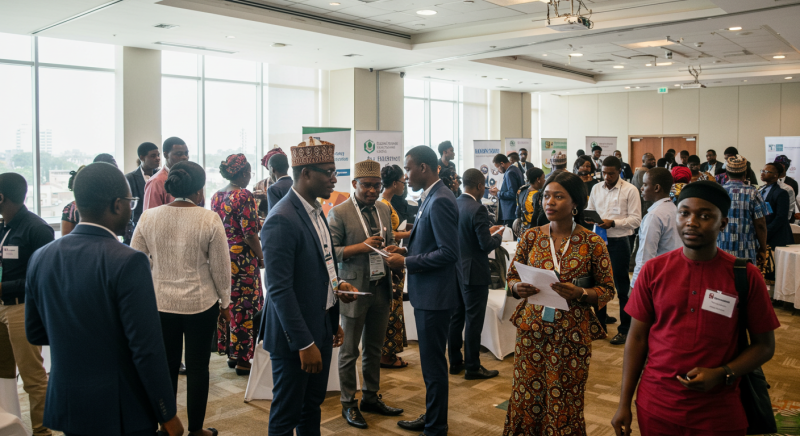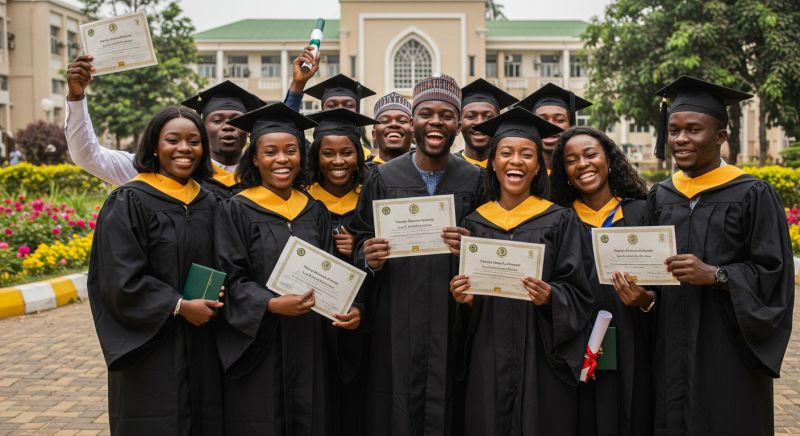The Life-Changing Power of Scholarships
Let me tell you about Chinedu from Enugu State. Three years ago, he was a brilliant student with exceptional grades but faced the grim reality that his family couldn’t afford to send him to university. His father, a school teacher, barely made enough to feed the family of six. Chinedu’s dreams of becoming an engineer seemed impossible until he learned about fully funded scholarships in Nigeria. After weeks of research and preparation, he secured a scholarship that covered his tuition, accommodation, and living expenses at a top university. Today, Chinedu is completing his final year of engineering, with job offers already lined up.
Like Chinedu, thousands of Nigerian students are searching for opportunities to fund their education. The cost of higher education continues to climb, with university tuition fees increasing by 20% in the last two years alone. Yet the number of fully funded scholarships in Nigeria and international opportunities for Nigerian students has also grown significantly.
This comprehensive guide will walk you through everything you need to know about securing fully funded scholarships in Nigeria for 2025, from finding the right opportunities to submitting winning applications that stand out from the crowd.
Key Takeaways
Understanding what fully funded scholarships in Nigeria actually cover is essential for proper financial planning. These scholarships typically include tuition fees, accommodation, monthly stipends, health insurance, and sometimes travel allowances.
The application process for most fully funded scholarships in Nigeria requires careful planning and typically involves multiple stages including initial screening, written tests, and interviews.
Meeting eligibility criteria is non-negotiable, with most scholarships requiring academic excellence (typically a minimum CGPA of 3.5 or First Class/Second Class Upper), demonstration of leadership qualities, community involvement, and sometimes specific demographic requirements.
Starting your application early gives you a competitive advantage, as many scholarships operate on a first-come, first-served basis even before their official deadlines.
Professional documentation including well-crafted personal statements, strong recommendation letters, and properly formatted certificates significantly increases your chances of success.

What Are Fully Funded Scholarships in Nigeria?
Fully funded scholarships in Nigeria are educational grants that cover all aspects of a student’s academic expenses. Unlike partial scholarships that might only cover tuition or a percentage of costs, fully funded scholarships provide comprehensive financial support.
These coveted opportunities typically include:
Complete tuition fee coverage for the entire duration of your program Monthly living stipends for daily expenses Accommodation costs or provision of housing Healthcare insurance Book and research allowances Travel grants for international scholarships Sometimes additional funding for conferences and professional development
According to data from the Federal Ministry of Education, approximately 10,000 fully funded scholarships are available to Nigerian students each year, both domestically and internationally, representing over ₦15 billion in educational funding. The Guardian Nigeria reported on the government’s recent commitment to increasing scholarship funding for Nigerian students.
The competition for these scholarships is fierce. The Nigerian Scholarship Board reported that in 2024, more than 200,000 students applied for various fully funded scholarship programs, with only about 5% receiving funding. This underscores the importance of having a strategic approach to your applications.
Top Fully Funded Scholarships in Nigeria for 2025
Nigerian Government Scholarships
The Bilateral Educational Agreement (BEA) Scholarships offer fully funded study opportunities in countries like Russia, China, Morocco, and Hungary. Applications typically open in January 2025, with a deadline in March 2025. The scholarship covers tuition, accommodation, and monthly stipends.
The Federal Government Scholarship covers undergraduate and postgraduate studies within Nigeria. The application window is expected to run from February to April 2025. This scholarship provides tuition fees and a modest monthly stipend of approximately ₦50,000 for qualifying students.
The Petroleum Technology Development Fund (PTDF) Scholarship focuses on oil and gas-related fields for Masters and PhD studies. Applications are projected to open in December 2024 and close in February 2025. This comprehensive scholarship includes tuition, living expenses, research grants, and return flight tickets for overseas studies.
Corporate Scholarships in Nigeria
The Shell Nigeria Exploration and Production Company (SNEPCo) National University Scholarship annually supports hundreds of undergraduate students. The 2025 application cycle opens in May and closes in July. Recipients receive full tuition coverage and an annual grant of ₦150,000.
The MTN Foundation Science and Technology Scholarship Scheme provides funding for 300 students annually across Nigerian universities. Applications begin in August and end in October 2025. The scholarship covers tuition and provides a book allowance of ₦120,000 per semester.
The Nigerian Liquefied Natural Gas (NLNG) Post-Primary and Undergraduate Scholarships support students from their host communities and nationwide. Applications are expected to open in March 2025 and close in May 2025. Benefits include full tuition payment and a yearly allowance of ₦100,000 for undergraduate students.
International Scholarships for Nigerian Students
The Chevening Scholarship offers fully funded opportunities for Masters degrees in the UK. Applications typically open in August and close in November. The British Council provides detailed information about eligibility and application procedures for Nigerian applicants. This prestigious scholarship covers tuition, living expenses, travel costs, and additional grants.
The Commonwealth Scholarship supports postgraduate studies in the UK for students from Commonwealth countries including Nigeria. Applications begin in August and close in October for the 2025/2026 academic year. It provides comprehensive funding including travel, living stipends, and research support.
The Fulbright Foreign Student Program enables graduate studies in the United States. Applications open in February and close in May 2025. This scholarship covers tuition, textbooks, health insurance, living expenses, and airfare.
The DAAD Scholarships for Nigeria provide opportunities for study and research in Germany. Application deadlines vary by program but typically fall between October and December for the following academic year. DAAD Nigeria offers comprehensive support and guidance for Nigerian applicants. Benefits include monthly stipends, health insurance, travel allowances, and study fees.
Eligibility Criteria for Fully Funded Scholarships in Nigeria

Understanding the eligibility requirements for fully funded scholarships in Nigeria is crucial before investing time in the application process. While specific criteria vary between programs, most share common requirements:
Academic Excellence
The primary requirement for almost all fully funded scholarships in Nigeria is outstanding academic performance. This typically means:
For undergraduate scholarships: A minimum of 5 credits in WAEC/NECO at one sitting including English and Mathematics, with exceptional JAMB scores (typically 250+) For postgraduate scholarships: A minimum CGPA of 3.5/5.0 or a Second Class Upper (2:1) degree classification from an accredited university For doctoral scholarships: A Masters degree with distinction or merit, often with published research work
According to education consultancy EduConsult Nigeria, 85% of successful scholarship recipients maintained an academic standing in the top 10% of their previous educational institutions.
Age Requirements
Many scholarships have strict age limits:
Undergraduate scholarships: Typically between 16-22 years Masters scholarships: Usually under 30 years PhD scholarships: Generally under 35 years, though some programs offer flexibility
Citizenship and Residency
Almost all fully funded scholarships in Nigeria require:
Nigerian citizenship (verified with a valid National ID, international passport, or birth certificate) For state-specific scholarships, proof of origin through Local Government certificates For community-based scholarships, evidence of residency in the specified regions
Additional Requirements
Leadership potential demonstrated through extracurricular activities, volunteer work, or community service English language proficiency (typically IELTS scores of at least 6.5 or TOEFL scores of 90+) Research proposal (for research-based postgraduate scholarships) Work experience (for certain professional and executive scholarships) Field of study restrictions (some scholarships only fund specific disciplines, particularly STEM fields)
Studies by the Nigerian Universities Commission showed that students who balanced academics with leadership activities were 40% more likely to receive fully funded scholarships in Nigeria than those with only strong academic credentials.
Application Process for Fully Funded Scholarships in Nigeria
Securing fully funded scholarships in Nigeria requires navigating a structured application process that typically involves multiple stages. Understanding this process gives you a significant advantage over other applicants.
Research and Selection Phase
Begin by identifying scholarships that match your academic profile, career goals, and eligibility criteria. Create a scholarship calendar with all potential opportunities and their respective deadlines. Education expert Dr. Oluwaseun Adebayo recommends applying for at least 5-7 scholarships to maximize your chances of success.
Useful resources for finding fully funded scholarships in Nigeria include:
The Federal Ministry of Education Scholarship Board website Opportunity Desk – a comprehensive portal for African scholarship opportunities ScholarshipsforAfricans.com – specialized in African education funding After School Africa portal
Documentation Preparation
Prepare the following essential documents well in advance:
Academic transcripts and certificates (require official stamps and authentication) Personal statement or statement of purpose (typically 500-1000 words) Curriculum Vitae highlighting academic achievements, work experience, and extracurricular activities Letters of recommendation (usually 2-3 letters from academic or professional references) Research proposal (for postgraduate research scholarships) Passport photographs (white background, professional attire) Valid identification documents
A study by Scholarship Region showed that 35% of scholarship applications from Nigerian students are rejected due to incomplete documentation. Double-check all requirements carefully.
Submission Process
Most fully funded scholarships in Nigeria now use online application systems, though some still require physical submissions. When submitting:
Create a dedicated email address for scholarship applications Complete all forms accurately and thoroughly Submit well before the deadline to avoid technical issues Save confirmation receipts and application numbers Follow up after submission if no acknowledgment is received within the specified timeframe
Selection and Interview Stages
The selection process typically includes:
Initial screening based on academic qualifications and documentation Written examinations for some programs (especially government scholarships) Video or in-person interviews for shortlisted candidates Final selection and award notification
The Nigerian Scholarship Board reported that only 20% of applicants for fully funded scholarships in Nigeria proceed to the interview stage, making thorough preparation essential.
Tips for Securing Fully Funded Scholarships in Nigeria
Start Early and Meet Deadlines
Begin your scholarship search at least 12-18 months before your intended start date. Early applicants have a 30% higher chance of success according to Scholarship Owl Nigeria. Create a detailed calendar with:
Research phase deadlines Document collection timeframes Application submission dates Follow-up schedules
Craft an Outstanding Personal Statement
Your personal statement should:
Tell your unique story and motivations Demonstrate clear alignment between your goals and the scholarship’s mission Highlight challenges you’ve overcome Showcase impact you’ve made in your community Articulate how the scholarship will help you achieve future goals
Professor Adebola Adekunle of Lagos State University notes that personal statements that connect personal experiences with future ambitions are twice as likely to impress selection committees.
Secure Strong Recommendation Letters
Approach potential referees who:
Know you well academically or professionally Can speak specifically about your strengths and potential Hold positions relevant to your field of study Are familiar with the scholarship you’re applying for
Provide them with your CV, personal statement, and scholarship details to help them write targeted recommendations.
Prepare Thoroughly for Interviews
Scholarship interviews for fully funded scholarships in Nigeria typically assess:
Your knowledge of your field and research interests Your leadership potential and problem-solving abilities Your career plans and how the scholarship fits into them Your personality and cultural fit with the sponsoring organization
Practice with mock interviews and prepare answers to common questions such as:
“Why do you deserve this scholarship?” “How will you contribute to Nigeria after your studies?” “What challenges do you anticipate in your studies and how will you overcome them?”
Showcase Community Impact and Leadership
Scholarship foundations increasingly look for candidates who demonstrate:
Volunteer experience in relevant fields Leadership roles in student organizations or community projects Innovative solutions to local problems Mentorship of younger students
The Mastercard Foundation, which offers several fully funded scholarships in Nigeria, reports that 80% of their scholars have significant community service experience.
Common Mistakes to Avoid When Applying for Fully Funded Scholarships in Nigeria
Applying for Too Few Scholarships
Many Nigerian students limit themselves to one or two high-profile scholarships. Education consultant Funmi Adeyemi recommends applying for at least 8-10 scholarships across different categories to increase your chances of success.
Missing Documentation or Incomplete Applications
Approximately 40% of scholarship applications are rejected without review due to missing documents or incomplete sections. Use a checklist for each scholarship to ensure all components are submitted correctly.
Generic Applications
Tailoring your application to the specific values and requirements of each scholarship program increases your success rate by up to 60%. Avoid the temptation to use the same personal statement for multiple applications.
Poor Online Presence
Increasingly, scholarship committees for fully funded scholarships in Nigeria research candidates online. Ensure your social media profiles reflect professionalism and align with the values expressed in your application.
Waiting Until the Last Minute
Last-minute applications often contain errors and lack the refinement needed to stand out. Aim to submit at least two weeks before deadlines to allow time for troubleshooting technical issues.
Success Stories: Nigerians Who Secured Fully Funded Scholarships
Amina Ibrahim – Chevening Scholar
Amina from Kaduna secured the prestigious Chevening Scholarship after three unsuccessful attempts. Her persistence paid off when she refined her application to focus on her work developing educational technology for rural schools. She’s now completing her Masters in Education Technology at University College London and has launched an EdTech startup that serves 50,000 students across Northern Nigeria.
Oluwatobiloba Ayoola – PTDF Scholar
Tobi graduated with a petroleum engineering degree but faced unemployment for two years. During this time, he volunteered with environmental cleanup projects in oil-affected communities in the Niger Delta. His hands-on experience and clear research proposal on sustainable extraction methods helped him secure the PTDF scholarship for a Masters at Imperial College London.
Chinaza Okonkwo – Commonwealth Scholar
Despite coming from a modest background in Enugu, Chinaza’s exceptional academic record and community health initiatives caught the attention of the Commonwealth Scholarship Commission. Her project providing menstrual health education to over 2,000 schoolgirls demonstrated both academic excellence and community impact. She’s currently pursuing a PhD in Public Health at the University of Edinburgh.
These success stories share common elements that you can incorporate into your own scholarship journey:
Persistence through multiple application cycles Clear alignment between personal experiences, scholarship values, and future goals Demonstrable impact in their communities Well-articulated vision for how they’ll use their education to benefit Nigeria
Preparing for Life After Securing Fully Funded Scholarships in Nigeria
Securing a scholarship is just the beginning of your journey. To make the most of this opportunity:
Academic Success Strategies
Develop strong time management skills before departure Form study groups with fellow scholars and classmates Utilize all academic resources provided by your institution Maintain regular communication with your academic advisor
Network Building
Connect with alumni from your scholarship program Join professional associations related to your field Attend conferences and workshops in your area of study Build relationships with professors and industry professionals
Giving Back
Many fully funded scholarships in Nigeria expect recipients to contribute to national development. Consider how you can:
Mentor future scholarship applicants Apply your knowledge to solve local challenges Participate in scholarship recruitment and selection processes Create opportunities for other Nigerian students
Career Planning
Begin planning your post-scholarship career early:
Use career services at your institution Seek internships during breaks Research employment opportunities in Nigeria Consider entrepreneurship options in your field

Conclusion
Securing fully funded scholarships in Nigeria requires dedication, strategic planning, and attention to detail. As education costs continue to rise, these scholarships represent invaluable opportunities for talented Nigerian students to achieve their academic dreams without financial burden.
Remember that the journey to obtaining fully funded scholarships in Nigeria is often as valuable as the scholarship itself. The research, self-reflection, and skill development involved in the application process prepare you for academic success and professional growth.
Start your scholarship search early, prepare meticulously, submit compelling applications, and persist through challenges. Like Chinedu, Amina, Tobi, and Chinaza, your scholarship journey can transform not only your life but also enable you to contribute meaningfully to Nigeria’s development.
The path to securing fully funded scholarships in Nigeria may be demanding, but the rewards—quality education, international exposure, prestigious networks, and freedom from educational debt—make every effort worthwhile.
Frequently Asked Questions
How many fully funded scholarships in Nigeria are available annually?
Approximately 10,000 fully funded scholarships are available to Nigerian students each year across government, corporate, and international programs. However, competition is fierce with over 200,000 applications submitted annually.
Can I apply for multiple scholarships simultaneously?
Yes, education experts recommend applying for 8-10 scholarships across different categories to maximize your chances. Just ensure you can fulfill all requirements if you receive multiple offers.
Do I need to repay fully funded scholarships after graduation?
Most fully funded scholarships in Nigeria do not require repayment. However, some may have service commitments, such as working in Nigeria for a specified period after completion of your studies.
How important are extracurricular activities for scholarship applications?
Very important. Research shows that 85% of successful scholarship recipients combined academic excellence with demonstrated leadership and community involvement.
Can I apply for fully funded scholarships in Nigeria if I have a Third Class degree?
Most fully funded scholarships require a minimum of Second Class Upper (2:1) classification. However, some industry-specific scholarships may consider exceptional work experience over academic classification.
How can I improve my scholarship application if I’ve been rejected previously?
Review the feedback if provided, strengthen your weakest application components, gain more relevant experience, refine your personal statement, and consider applying for less competitive scholarships initially.
Are there fully funded scholarships for vocational training in Nigeria?
Yes, though fewer than academic scholarships. The Industrial Training Fund (ITF) and various state technical education boards offer vocational training scholarships with varying levels of funding.
Do fully funded scholarships cover family members?
Most fully funded scholarships in Nigeria cover only the student. However, some PhD and research scholarships may provide additional allowances for dependents.
How can I verify if a scholarship opportunity is legitimate?
Check official websites, contact the sponsoring organization directly, verify with the Nigerian Scholarship Board, and be wary of scholarships requesting application fees.
What happens if I cannot maintain the required grades during my scholarship?
Most scholarships have academic continuation requirements. Failing to maintain minimum grades typically results in probation and potential withdrawal of funding if improvement doesn’t occur.
Image Prompts
- A split screen showing a student’s journey from studying in a simple Nigerian classroom to an international university campus
- A close-up of hands filling out scholarship application forms with careful attention to detail
- A student being interviewed by a scholarship committee in a formal setting, demonstrating confidence
- A timeline infographic showing key scholarship application deadlines throughout the year
- A mentor helping a younger student prepare scholarship documents, emphasizing the importance of guidance
- Nigerian scholarship alumni returning to their communities to implement projects learned during their studies
- A student receiving an acceptance email for a fully funded scholarship, showing the emotional impact of the moment
